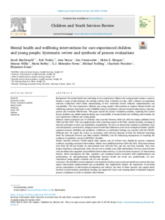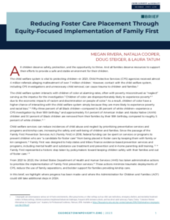Displaying 71 - 80 of 2176
Native American mothers whose children were separated from them – either through child removal for assimilation into residential boarding schools or through coerced adoption – experience the kind of grief no parent should ever feel. Yet theirs is a loss that is ongoing, with no sense of meaning or closure.
This analysis considers foster care regulations in three jurisdictions in Finland, New Zealand, and Wisconsin, USA, and the effects of policy decisions on eligibility for relative caregivers and placement options for children in out-of-home care.
The proposed plan ‘will harm vulnerable children who need loving homes and set a precedent that undermines everyone’s parental rights,’ an ethicist warns.
Former President Donald Trump, the leading candidate for the Republican presidential nomination in 2024, has promised to crack down on illegal immigration and restrict legal immigration if elected to a second term in office.
Bethan Carter, a research associate at Cardiff University, discusses the ReThink Project; a project run in collaboration with Adoption UK and Coram Voice to investigate what processes are linked to mental health and wellbeing of care-experienced young people and how they manage at two key transitions in life.
During this webinar, participants explored the role of the Catholic Church in the separation of Indigenous children from their families and the long-lasting effect on Indigenous communities.
This global systematic review incorporated a comprehensive search of available literature from 1990 and captures the extant literature relating to process evaluations for interventions which address care-experienced children and young people’s mental health and well-being, and is one of the first syntheses of process evaluations in social care.
From 2021 to 2023, the United States Department of Health and Human Services (HHS) has taken administrative actions to prioritize the implementation of Family First prevention services. These actions minimize traumatic deployments of CPS, reduce the use of family separations, and bolster support for families providing kinship care. In this brief, the authors highlight where progress has been made—and where the Administration for Children and Families (ACF) could still take additional steps in 2024.
Relatives and family friends who step up when struggling parents can’t care for their children play an essential role in keeping countless kids out of foster care. In New York, hundreds of these caregivers receive monthly financial payments that amount to thousands of dollars a year, through the state’s Kinship Guardianship Assistance Program (KinGAP). But here and across the nation, the money is still tight, and not everyone who takes in foster children qualifies.
Each year, over 250,000 U.S. children enter foster care. This forcible family separation – among the most extreme and intrusive government actions – occurs much more often than many realize, particularly among Black and Native American families. A staggering one in eleven Black children and one in nine Native American children will be placed in foster care by the age of 18.



